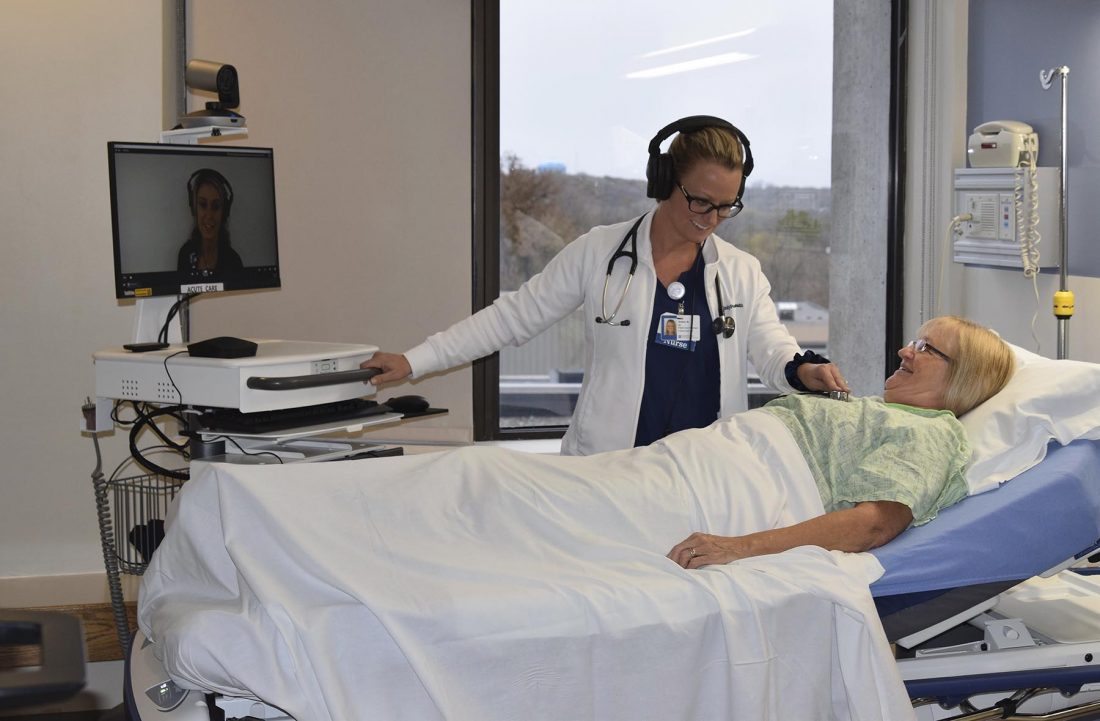At UnityPoint in Fort Dodge, telemedicine takes off
-
-Submitted photo
UnityPoint — Trinity Regional medical Center nurse Amber Barkhaus demonstrates new inpatient telemedicine technology on team member Ellen Vanderhoff. The hospital’s new telemedicine program launched earlier this month.

-Submitted photo
UnityPoint — Trinity Regional medical Center nurse Amber Barkhaus demonstrates new inpatient telemedicine technology on team member Ellen Vanderhoff. The hospital’s new telemedicine program launched earlier this month.
UnityPoint Health — Trinity Regional Medical Center has added six new hospitalists to its staff this month. The catch is, however, that none of them will ever step foot into the Fort Dodge hospital.
TRMC launched its new telemedicine program on Nov. 5 with the goal to ensure consistent physician coverage for the hospital’s overnight patients. It has partnered with Eagle Telemedicine for the program.
“We are pleased to bring the benefits of telemedicine to our patients,” said Leah Glasgo, president and chief executive officer of TRMC. “This program improves our ability to continue providing exceptional patient care during the overnight hours. The telemedicine physicians we are working with are an expansion of our team who collaborate with our own doctors and provide guidance and expertise to our nurses and other clinical staff.”
The telemedicine program will be used for patients staying in the hospital and needing physician care between 7 p.m. to 7 a.m. If a patient needs to be seen by a physician, a nurse will roll a cart into their room, which is equipped with a digital stethoscope and other diagnostic equipment, as well as a videoconferencing monitor and camera.
“We have a cart with state-of-the-art equipment that has a stethoscope on it and then it’s got a camera that can zoom in and move around the room,” said Jolie Fenoglio, chief nurse executive for the hospital. “The physician is on the other end and is speaking to the patient and can speak to the nurse, helps the nurse through the process of the physical piece of it and then does the history piece of it afterwards. They’re very interactive with the patient, very interactive with the staff.”
The move is aimed at maintaining the quality of care overnight patients expect from Trinity while minimizing the number of nighttime visits that daytime physicians must make and to fill staffing gaps.
“When we start looking at our sustainability of our hospitalist programs, we have to look at how can we retain our hospitalists and how can we also recruit hospitalists to a rural area,” Fengolio said. “Part of that retention piece is a lot of hospitalists don’t like to work on the night shift, so how do we have that work-life balance for them and have them be able to work on a shift they might prefer.”
Financial sustainability is also behind the program.
“We were paying a provider to be in-house all night long to see one or two patients,” said Dr. Alex Cathey, medical director of the hospital medicine program. “So what telemedicine allows us to do is spread that work across all of rural Iowa or large swaths of rural Iowa so that provider’s not just seeing patients here, but may also be seeing patients in our other affiliates.”
The six telehospitalists will be “beaming in” from various locations like Oklahoma, Kansas, Florida, Colorado and North Carolina.
The physicians will have access to patient charts and real-time test results and information.
“The camera can magnify, so they can see things with their camera that I can’t see with my human eyes,” Cathey said. “In many ways, there are many real advantages to practicing this way.”
So far, the hospital has received generally good feedback from patients who have used it, Fenoglio said. The patients have liked the providers they have interacted with over the telemedicine system.
“We call it ‘web-side manner,'” Christina Fevold, nurse manager, said of the physicians’ interactions with patients.
The nursing staff wasn’t always 100 percent on board with the idea of the telemedicine program, Fevold said.
“With any change, there’s going to be hesitancy,” she said. “No matter what the change is, there’s always going to be a little reservation and hesitancy. Now that we’ve gone live, they like it, they think it’s something that is a huge value add.”
While the telehospitalists will be seeing patients in the overnight hours, the patients will also be seen by an on-site physician again in the morning to continue their care.
The hospital leaders want to remind the community that the emergency room will continue to be staffed by local physicians at all hours, and physician specialists will still be on call to respond as needed. This telemedicine program will only affect inpatient populations.






